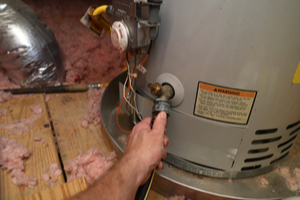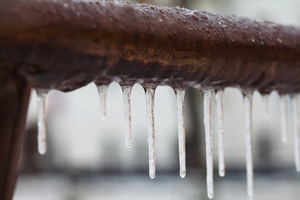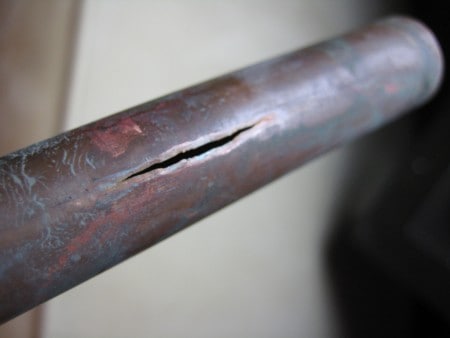January 25, 2024
What to Do When Hot Water Pipes Freeze
Frozen pipes can be costly and catastrophic. Every year Applewood’s licensed plumbers repair hundreds of broken pipes for unfortunate homeowners during the winter months. Spare yourself the expense and heartbreak of icy water spilling across your home with advice from our experts.
We’ll cover prevention, how to fix frozen pipes and tell you what to do if you encounter a frozen or burst pipe in your home. We also cover potential issues with frozen hot water heater lines. Don’t run the risk of pipes freezing in your home; take these preventative measures.

How to Prevent Frozen Pipes in Your Home: 7 Steps
The pipes to be most concerned about are any with outside connections and those that have frozen in the past. These are the obvious targets for preemptive plumbing actions. Here’s how to keep pipes from freezing in seven steps:
1. Insulate Vulnerable Pipes
A layer of insulation can keep cold temps from freezing the water within. If your pipes are exposed to harsh elements, consider wrapping them with electric heat coils. Make sure the coils are plugged in and you use a thermostat to keep a constant temperature on them.
2. Remove Hoses and Turn Off Outside Faucets
With the hoses attached, the faucet can’t drain properly, and frozen water may back up into the pipes.
3. Keep Your Heat On
Resist the temptation to save a few dollars by keeping your thermostat low or off when you’re not home. The consequences are a lot pricier. 55 degrees is the recommended minimum to set your heat to.
4. Circulate Warm Air to Your Pipes
If you need to, open interior doors and cupboards to ensure warm air is flowing to all areas of your home with pipes. Cabinets on exterior walls are at risk here.
5. Let Your Faucets Trickle
Running water doesn’t freeze as easily as still water. If you’re worried about freezing during cold dips, keep a constant faucet drip to ensure water continues to flow through your pipes without freezing.
6. Locate Your Emergency Shut Off
At the point where the water line enters your home, you have a plumbing shut off valve. If a pipe does burst somewhere in your home, you can shut the water off here and prevent more damage from occurring.
7. Close Garage Doors
Cold air from a drafty garage can spill over to basement pipes. Keep garage doors closed to minimize heat loss.
5 Steps to Treat Frozen Water Pipes
If you have frozen pipes, act quickly to minimize the potential for damage. Follow these steps and, if need be, contact a plumber for back up.
1. Turn on the Faucet Associated with the Frozen Pipe
Turn on whichever faucet or fixture water from the frozen pipe is flowing toward. This will help relieve the pressure of ice build up and allow the water an outlet as it melts.
2. Warm the Pipe
An easy method for heating frozen pipes is with a hairdryer. Make sure your hair dryer is grounded and never hold the pipe while you’re operating an electrical appliance. Other options include heating pads, warm towels or a space heater to thaw pipes. Never use an open flame on a frozen pipe.
3. Start Thawing Near the Faucet
The melting water needs an escape outlet. Heat the section nearest the faucet and work your way back from there. Once the pipe is thawed, be sure to keep it warm to prevent refreeze.
4. Turn Off the Main Shut Off
If your pipe bursts before you can thaw it, immediately shut off the water to your home. If you have boiler heat in your home, you’ll want to use the main shut off as a last resort as it may also compromise your boiler.
5. Call a Plumber
If your pipe bursts or won’t thaw, don’t hesitate to call in a professional. The alternative can be a lot worse. A professional plumber can expedite thawing or replace pipes that have burst. They can also insulate pipes and strategize how to prevent future issues when temperatures drop.
Prevent Your Water Heater From Freezing

Frozen hot water heater lines pose a similar problem as your other plumbing. To determine which lines are frozen, turn on the hot water at all your faucets. If some work, you have an isolated frozen hot water pipe. If none of them produce warm water, you likely have a frozen hot water heater line.
Follow the same steps as above to warm the pipes in question. If you have hot water in your water heater tank, you can drain it out via the valve at the bottom and use the water to create warm towel wraps for your pipes.
To Drain Your Water Heater:
- Turn off the water supply at the cold-water intake.
- Turn off power (pilot mode for gas, circuit breaker switch for electric).
- Attach a hose to the drain valve at the bottom and run it to a floor drain.
- Open the nearest hot water tap to vent the pressure.
- Open the hot water valve – be careful as hot water releases.
- Close the valve before restarting your water heater.
Avoid a Frozen Water Heater
If your water heater is at risk of freezing, drain the water out to prevent it from bursting or the glass liner shattering when the ice expands. A ruptured water heater is an unwanted headache and expense.
Tips for Winterizing Your Home or Cabin While You’re Away
The Colorado mountains are home to many wonderful cabins and vacation homes. For those times when you’ll be away for an extended time try these tips that work in the city or in rural areas:
- Turn off the water supply at the main shutoff valve by the street. You may have to have your water utility company do this for you.
- Remove garden hoses from outside faucets and open these faucets to drain them.
- Drain the water heater. Turn off the pilot light on gas water heaters and be sure to turn off the electricity to electric water heaters before you drain them.
- Use an air compressor to blow any trapped water from the water pipes. A contractor can help with this if you’re not comfortable doing it yourself.
- Open all faucets and leave them open. This will help keep condensation from freezing and bursting the water lines.
- Flush all toilets (to empty the tank) and every faucet (to drain water from pipes) in the home, including outdoor faucets.
- Empty all toilet bowls by siphoning or bailing and sponging.
- Pour a mixture of food grade antifreeze and water into all toilet bowls and traps of all sinks, showers and bathtubs. Don’t drain these traps. The water in them keeps sewer gasses out of your house.
- If your water supply is from a well, switch off the pump and drain it, along with the above-ground pump lines and the tank.
Your Frozen Pipe Plumber in Colorado

Don’t take chances if you have frozen or burst pipes. We’ve helped hundreds of satisfied customers with their plumbing during the cold season. We know how urgent your situation can be. Call Applewood or schedule your service today.



